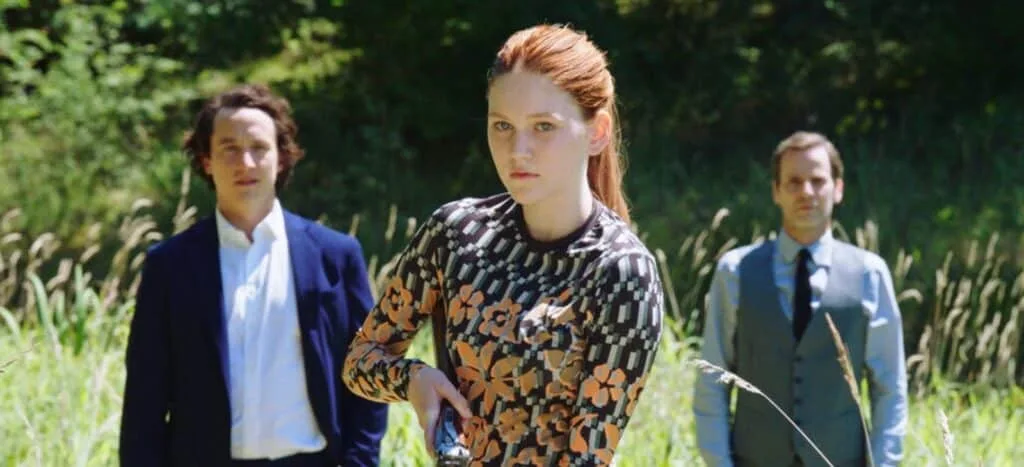
A cyclist making his way up a winding Austrian hill is first paused, then stopped forever by a sniper’s bullet before two surprisingly languid-looking hunters step out of the undergrowth, seizing his pushbike in the name of ‘recycling’. That’s about as dramatic as we ever get in Veni Vidi Vici (2024), a film which spends most of its time presenting the audience with an indolent, privileged world, occasionally pointing at something darker, but retreating into its indolence instead. We are left in no doubt, even very early on, that we’re looking at a very moneyed existence: the big clue, for me, is the classical music playing over a slow-mo game of polo. Just call it intuition. In fact, this is the film in a nutshell: it’s no subtle social commentary, though at times it seems to believe that it is. Elsewhere, however, it’s content to luxuriate in the pretty world at its core, and your tolerance for this will largely dictate how much you enjoy the film and its glib treatment of power, status and wealth disparity.
Next, we get better acquainted with the family, of whom so far we’ve met one sniper and one cheating polo player. These are, respectively, father Amon Maynard (Laurence Rupp) and his eldest daughter, Paula (Olivia Goschler). There’s also mother Viktoria (Ursina Lardi) and younger siblings, Coco and Bella. Viktoria is trying for a pregnancy, despite it being a regular tussle with Mother Nature, given her advancing years. Paula, our occasional narrator, adds an interesting, rather detached voice to proceedings, sometimes seemingly inside the family group and sometimes outside it. When dad isn’t shooting people, a hobby he enjoys with seeming impunity, he’s working on requisitioning part of the local countryside to use for a brand-new battery factory, lobbying local politicians to do so. However, the presence of a sniper in the local area is a complicating factor: the powers-that-be wonder if it’s something to do with Maynard, or someone in his circle, deliberately meddling in law and order for his own ends (it did seem for a moment there that this would be the case, in a kind of Dream Home (2010) way, but this possible plot development never fully gets off the ground).
Perhaps where the film begins to lose some goodwill is in the way it quickly dwindles into inaction, despite seemingly positioning itself as about to explore some potentially dynamic ideas. There’s never an upsurge in action here, nor any real surprises. There’s a lot of talking though, including by Volter (Dominik Warta), a down-at-heel investigative journalist (signified by his knackered leather jacket and unshaven face). Volter is onto Maynard. There’s also a witness called Alois, who seems determined to get the police to listen to him. But if anything, the lives of the Maynards grow even more charmed, despite these incursions.
There’s a very shallow narrative arc in Veni Vidi Vici, and an uncharitable opinion would be that this film is all set-up, no pay-off. It’s a defensible take. This film is immersive rather than instructive, destructive or dramatic. Where it does excel is in its depiction of modern torpor, in a world where wealth and cruelty seem to go remarkably, consistently unchallenged by the people most harmed by it. When Maynard asks, “Where’s the uprising?”, the line lands, despite being a simple encapsulation of an often complex, recognisable puzzler. There’s a gentle, but familiar feeling of exasperation hovering here. The film also affords itself a few moments of whimsical humour. It’s all somehow oddly compelling.
The film looks extraordinarily lovely, too. It all unfolds against that recognisable kind of minimalist luxury, the bare concrete and stone floors which signify real wealth. It’s odd how, nowadays, the really rich people like to live in structures which look like empty warehouses. Elsewhere, the film snaps into a different mode, revelling in soft fabrics, block pastels and a Cath Kidston world of florals, prettily-wrapped gifts, balloons and glitter. Ah, the gorgeous, sunlit uplands of having fuck all to do. These are easeful lives, lived by objectionable people. Things never get weirder or more momentous than that, even though the film tantalises a few things. Does it suggest that compulsive behaviour will catch up with anyone, in time? Or that attempts to tackle inequality will always fall flat, where people at large have spent long enough perfecting deliberate ignorance? A little of the latter, sure, but this isn’t a film with any cathartic moves to make, and this may well be the whole point, even if it means a rather hollow-feeling film overall.
Veni Vidi Vici (2024) will feature at both the Glasgow Film Festival (UK Premiere) and watchAUT (London Premiere) in March 2025.
